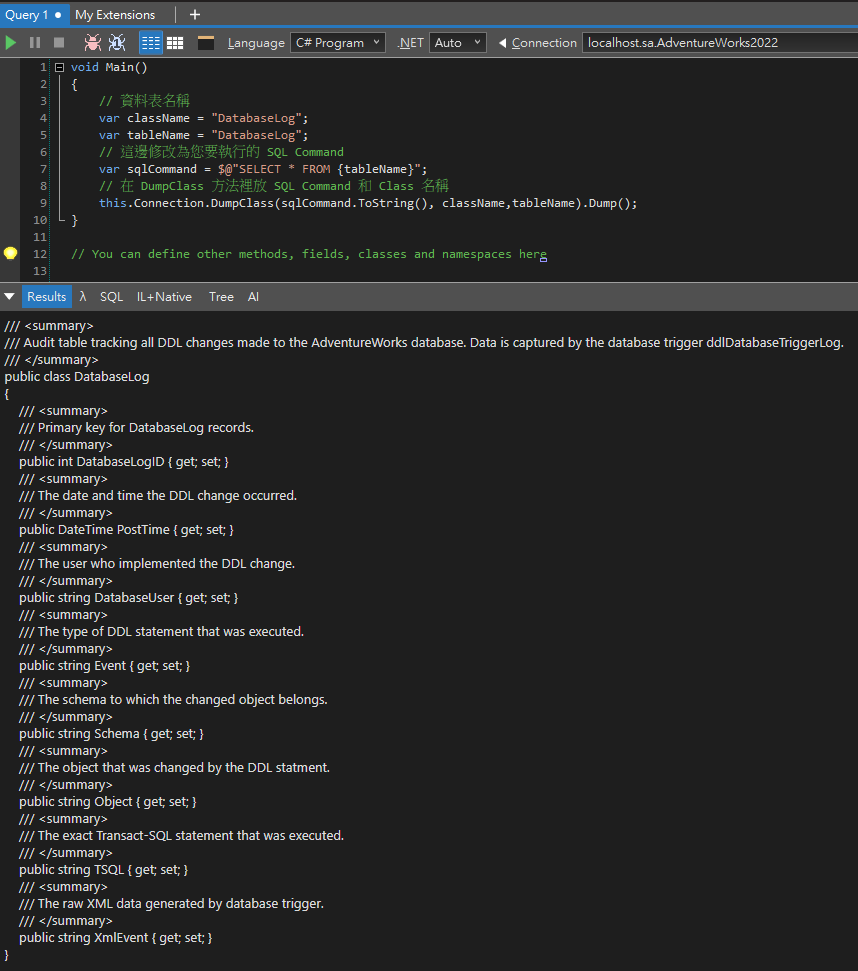前言
最近需要產生大量的資料表模型(DBModle),但時常常又會面臨表格修改,環境有些限制所以不是使用EF,所以找了一些產生POCO的方式,搭配LINQPad就可以快速產生對應資料模型。
需求
首先其實網路上可以找到不少作法,可以產生出基礎的資料模型, 但是不太符合我當前的需求,我還想要取得資料表中的描述資訊當作註解, 方便識別資料模型每一個屬性用途。
作法
擴充 MyExtensions
1 2 3 4 5 6 7 8 9 10 11 12 13 14 15 16 17 18 19 20 21 22 23 24 25 26 27 28 29 30 31 32 33 34 35 36 37 38 39 40 41 42 43 44 45 46 47 48 49 50 51 52 53 54 55 56 57 58 59 60 61 62 63 64 65 66 67 68 69 70 71 72 73 74 75 76 77 78 79 80 81 82 83 84 85 86 87 88 89 90 91 92 93 94 95 96 97 98 99 100 101 102 103 104 105 106 107 108 109 110 111 112 113 114 115 116 117 118 119 120 121 122 123 124 125 126 127 128public static class MyExtensions { // Write custom extension methods here. They will be available to all queries. public static string DumpClass(this IDbConnection connection, string sql, string >className = "Info",string tableName = "Info") { var descDict = connection.DumpClassDesc(tableName); if (connection.State != ConnectionState.Open) { connection.Open(); } var cmd = connection.CreateCommand(); cmd.CommandText = sql; var reader = cmd.ExecuteReader(); var builder = new StringBuilder(); do { if (reader.FieldCount <= 1) continue; if (descDict.TryGetValue(tableName, out _)) { builder.AppendLine("/// <summary>"); builder.AppendLine($"/// {descDict[tableName]}"); builder.AppendLine("/// </summary>"); } builder.AppendFormat("public class {0}{1}", className, Environment.NewLine); builder.AppendLine("{"); var schema = reader.GetSchemaTable(); foreach (DataRow row in schema.Rows) { var type = (Type)row["DataType"]; var name = TypeAliases.ContainsKey(type) ? TypeAliases[type] : type.Name; var isNullable = (bool)row["AllowDBNull"] && NullableTypes.Contains(type); var collumnName = (string)row["ColumnName"]; if (descDict.TryGetValue(collumnName, out _)) { builder.AppendLine("\t/// <summary>"); builder.AppendLine($"\t/// {descDict[collumnName]}"); builder.AppendLine("\t/// </summary>"); } builder.AppendLine(string.Format("\tpublic {0}{1} {2} {{ get; set; }}", >name, isNullable ? "?" : string.Empty, collumnName)); //builder.AppendLine(); } builder.AppendLine("}"); builder.AppendLine(); } while (reader.NextResult()); //關閉連線 connection.Close(); return builder.ToString(); } private static Dictionary<string, string> DumpClassDesc(this IDbConnection connection, >string tableName = "Info") { if (connection.State != ConnectionState.Open) { connection.Open(); } var sign = "."; var defaultDbo = "dbo"; tableName = tableName.Replace("[","").Replace("]",""); if (tableName.Contains(sign)) { var temp = tableName.Split(sign); defaultDbo = temp.First(); tableName = temp.Last(); } var sql = $@"SELECT objname AS [ColunmName], value AS [Desc] FROM fn_listextendedproperty (NULL, 'schema', '{defaultDbo}', 'table', >N'{tableName}', NULL, default) WHERE name = 'MS_Description' AND objtype = 'TABLE' UNION SELECT objname AS [ColunmName], value AS [Desc] FROM fn_listextendedproperty (NULL, 'schema', '{defaultDbo}', 'table', >N'{tableName}', 'column', default) WHERE name = 'MS_Description' AND objtype = 'COLUMN'"; var dict = new Dictionary<string, string>(); var cmd = connection.CreateCommand(); cmd.CommandText = sql; try { var reader = cmd.ExecuteReader(); while (reader.Read()) { var val = reader[1].ToString().Replace("\r\n", " "); dict.Add($"{reader[0]}", $"{val}"); } reader.Close(); } catch (Exception ex) { Console.WriteLine(ex.Message); } connection.Close(); return dict; } private static readonly Dictionary<Type, string> TypeAliases = new Dictionary<Type, >string> { { typeof(int), "int" }, { typeof(short), "short" }, { typeof(byte), "byte" }, { typeof(byte[]), "byte[]" }, { typeof(long), "long" }, { typeof(double), "double" }, { typeof(decimal), "decimal" }, { typeof(float), "float" }, { typeof(bool), "bool" }, { typeof(string), "string" } }; private static readonly HashSet<Type> NullableTypes = new HashSet<Type> { typeof(int), typeof(short), typeof(long), typeof(double), typeof(decimal), typeof(float), typeof(bool), typeof(DateTime) }; }
Demo
資料庫使用AdventureWorks2022做展示

小結
程式碼並沒有寫很漂亮,只是需要產出,有興趣的朋友可以在改寫可以再跟我分享XD,完整程式碼分享放在下方連結中有需要請自取。